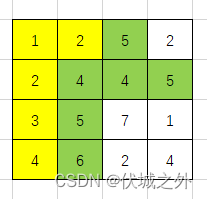题目描述
现有一个机器人,可放置于 M × N 的网格中任意位置,每个网格包含一个非负整数编号,当相邻网格的数字编号差值的绝对值小于等于 1 时,机器人可以在网格间移动。
问题: 求机器人可活动的最大范围对应的网格点数目。
说明:网格左上角坐标为 (0,0) ,右下角坐标为(m−1,n−1),机器人只能在相邻网格间上下左右移动
输入描述
第 1 行输入为 M 和 N , M 表示网格的行数 N 表示网格的列数
之后 M 行表示网格数值,每行 N 个数值(数值大小用 k 表示),
数值间用单个空格分隔,行首行尾无多余空格。
M、 N、 k 均为整数,且 1 ≤ M,N ≤ 150, 0 ≤ k ≤ 50
输出描述
输出 1 行,包含 1 个数字,表示最大活动区域的网格点数目,
行首行尾无多余空格。
用例
| 输入 | 4 4 1 2 5 2 2 4 4 5 3 5 7 1 4 6 2 4 |
| 输出 | 6 |
| 说明 |
图中绿色区域,相邻网格差值绝对值都小于等于 1 ,且为最大区域,对应网格点数目为 6。 |
题目解析
本题其实就是求最大的连通分量,相邻网格是否连通的规则如下
当相邻网格的数字编号差值的绝对值小于等于 1 时
因此,求解连通分量,我们可以使用并查集。关于并查集的知识,请看:
JavaScript算法源码
/* JavaScript Node ACM模式 控制台输入获取 */
const readline = require("readline");
const rl = readline.createInterface({
input: process.stdin,
output: process.stdout,
});
const lines = [];
let m, n;
rl.on("line", (line) => {
lines.push(line);
if (lines.length === 1) {
[m, n] = lines[0].split(" ").map(Number);
}
if (m && lines.length === m + 1) {
lines.shift();
const matrix = lines.map((line) => line.split(" ").map(Number));
console.log(getResult(matrix, m, n));
lines.length = 0;
}
});
function getResult(matrix, m, n) {
const ufs = new UnionFindSet(m * n);
// 上下左右的偏移量
const offset = [
[-1, 0],
[1, 0],
[0, -1],
[0, 1],
];
for (let i = 0; i < m; i++) {
for (let j = 0; j < n; j++) {
// 注意下面这层for是常量级的,就四次循环,因此,这里的时间复杂度还是O(n*m),即
for (let k = 0; k < offset.length; k++) {
const [offsetX, offsetY] = offset[k];
const newI = i + offsetX;
const newJ = j + offsetY;
if (newI < 0 || newI >= m || newJ < 0 || newJ >= n) continue;
if (Math.abs(matrix[i][j] - matrix[newI][newJ]) <= 1) {
ufs.union(i * n + j, newI * n + newJ);
}
}
}
}
let total = m * n;
// ufs.count是连通分量的个数,如果只有一个连通分量,那么代表所有的点都可达
if (ufs.count === 1) return total;
// 这个for循环是有必要的,确保每个点都指向祖先
for (let i = 0; i < total; i++) {
ufs.find(i);
}
// 统计指向同一个祖先下点的个数,即每个连通分量下的点个数
const countObj = ufs.fa.reduce((p, c) => {
p[c] ? p[c]++ : (p[c] = 1);
return p;
}, {});
// 取最大个数
return Math.max.apply(null, Object.values(countObj));
}
class UnionFindSet {
constructor(n) {
this.fa = new Array(n).fill(0).map((_, i) => i);
this.count = n;
}
find(x) {
if (x !== this.fa[x]) {
return (this.fa[x] = this.find(this.fa[x]));
}
return x;
}
union(x, y) {
const x_fa = this.find(x);
const y_fa = this.find(y);
if (x_fa !== y_fa) {
this.fa[y_fa] = x_fa;
this.count--;
}
}
}
Java算法源码
import java.util.HashMap;
import java.util.Scanner;
public class Main {
public static void main(String[] args) {
Scanner sc = new Scanner(System.in);
int m = sc.nextInt();
int n = sc.nextInt();
int[][] matrix = new int[m][n];
for (int i = 0; i < m; i++) {
for (int j = 0; j < n; j++) {
matrix[i][j] = sc.nextInt();
}
}
System.out.println(getResult(matrix, m, n));
}
public static int getResult(int[][] matrix, int m, int n) {
UnionFindSet ufs = new UnionFindSet(m * n);
// 上下左右的偏移量
int[][] offsets = {{-1, 0}, {1, 0}, {0, -1}, {0, 1}};
for (int i = 0; i < m; i++) {
for (int j = 0; j < n; j++) {
// 注意下面这层for是常量级的,就四次循环,因此,这里的时间复杂度还是O(n*m),即
for (int[] offset : offsets) {
int newI = i + offset[0];
int newJ = j + offset[1];
if (newI < 0 || newI >= m || newJ < 0 || newJ >= n) continue;
// 当相邻网格的数字编号差值的绝对值小于等于 1 时,机器人可以在网格间移动,即表示网格连通,可以合并
if (Math.abs(matrix[i][j] - matrix[newI][newJ]) <= 1) {
ufs.union(i * n + j, newI * n + newJ);
}
}
}
}
int total = m * n;
// ufs.count是连通分量的个数,如果只有一个连通分量,那么代表所有的点都可达
if (ufs.count == 1) return total;
// 这个for循环是有必要的,确保每个点都指向祖先
for (int i = 0; i < total; i++) {
ufs.find(i);
}
// 统计指向同一个祖先下点的个数,即每个连通分量下的点个数
HashMap<Integer, Integer> count = new HashMap<>();
for (int i : ufs.fa) {
count.put(i, count.getOrDefault(i, 0) + 1);
}
// 取最大个数,这里必然有值,因此不需要在get前判空
return count.values().stream().max((a, b) -> a - b).get();
}
}
// 并查集
class UnionFindSet {
int[] fa;
int count;
public UnionFindSet(int n) {
this.fa = new int[n];
this.count = n;
for (int i = 0; i < n; i++) this.fa[i] = i;
}
public int find(int x) {
if (x != this.fa[x]) {
return (this.fa[x] = this.find(this.fa[x]));
}
return x;
}
public void union(int x, int y) {
int x_fa = this.find(x);
int y_fa = this.find(y);
if (x_fa != y_fa) {
this.fa[y_fa] = x_fa;
this.count--;
}
}
}
Python算法源码
# 并查集
class UnionFindSet:
def __init__(self, n):
self.fa = [idx for idx in range(n)]
self.count = n
def find(self, x):
if x != self.fa[x]:
self.fa[x] = self.find(self.fa[x])
return self.fa[x]
return x
def union(self, x, y):
x_fa = self.find(x)
y_fa = self.find(y)
if x_fa != y_fa:
self.fa[y_fa] = x_fa
self.count -= 1
m, n = map(int, input().split())
matrix = []
for i in range(m):
matrix.append(list(map(int, input().split())))
ufs = UnionFindSet(m * n)
# 上下左右的偏移量
offsets = ((-1, 0), (1, 0), (0, -1), (0, 1))
for i in range(m):
for j in range(n):
# 注意下面这层for是常量级的,就四次循环,因此,这里的时间复杂度还是O(n*m),即
for offsetX, offsetY in offsets:
newI = i + offsetX
newJ = j + offsetY
if 0 <= newI < m and 0 <= newJ < n and abs(matrix[i][j] - matrix[newI][newJ]) <= 1:
ufs.union(i * n + j, newI * n + newJ)
total = m * n
# ufs.count是连通分量的个数,如果只有一个连通分量,那么代表所有的点都可达
if ufs.count == 1:
print(total)
else:
# count字典用于统计指向同一个祖先下点的个数,即每个连通分量下的点个数
count = {}
# 这个for循环是有必要的,确保每个点都指向祖先
for i in range(total):
ufs.find(i)
fa = ufs.fa[i]
count[fa] = count.get(fa, 0) + 1
# 取最大个数
print(max(count.values()))
免责声明:
1、IT资源小站为非营利性网站,全站所有资料仅供网友个人学习使用,禁止商用
2、本站所有文档、视频、书籍等资料均由网友分享,本站只负责收集不承担任何技术及版权问题
3、如本帖侵犯到任何版权问题,请立即告知本站,本站将及时予与删除下载链接并致以最深的歉意
4、本帖部分内容转载自其它媒体,但并不代表本站赞同其观点和对其真实性负责
5、一经注册为本站会员,一律视为同意网站规定,本站管理员及版主有权禁止违规用户
6、其他单位或个人使用、转载或引用本文时必须同时征得该帖子作者和IT资源小站的同意
7、IT资源小站管理员和版主有权不事先通知发贴者而删除本文

评论0